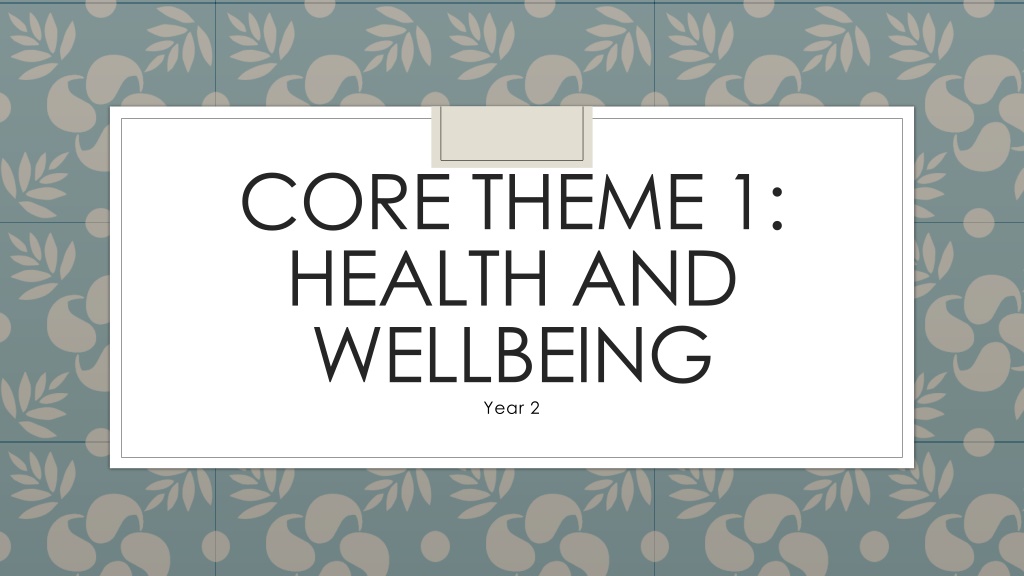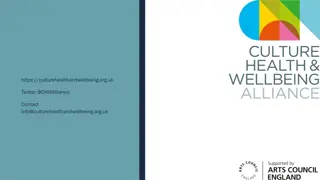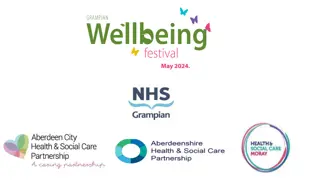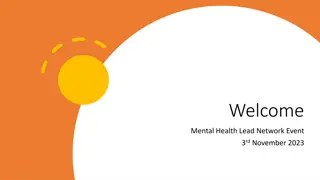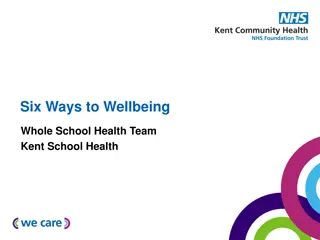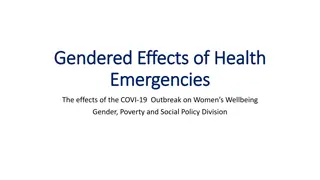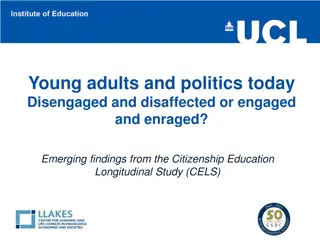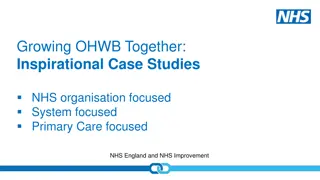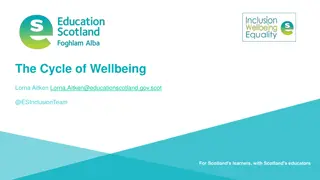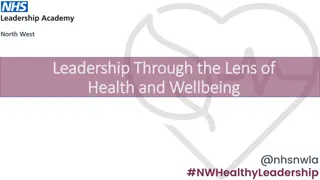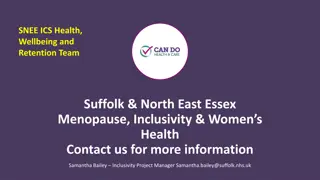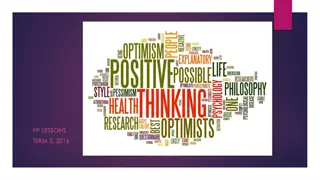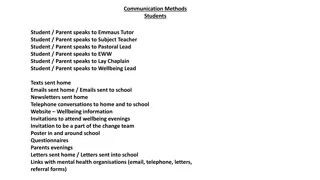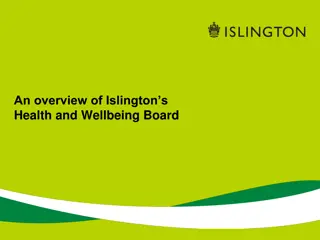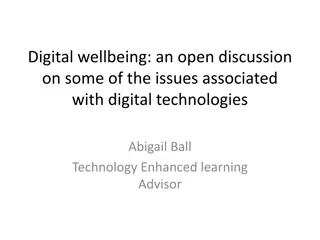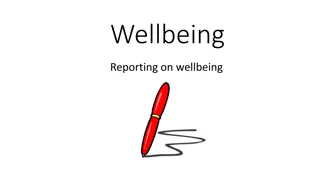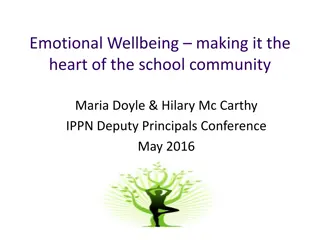Promoting Health and Wellbeing in Young Adults
This theme focuses on managing transitions to independent living, maintaining physical and mental health, assessing risks, accessing support, making informed choices, responding to emergencies, and understanding media influence on lifestyle. Lessons cover topics like healthy diet, mental health issues, social integration, media pressure, personal safety, and risk assessment.
Uploaded on Mar 10, 2025 | 0 Views
Download Presentation

Please find below an Image/Link to download the presentation.
The content on the website is provided AS IS for your information and personal use only. It may not be sold, licensed, or shared on other websites without obtaining consent from the author.If you encounter any issues during the download, it is possible that the publisher has removed the file from their server.
You are allowed to download the files provided on this website for personal or commercial use, subject to the condition that they are used lawfully. All files are the property of their respective owners.
The content on the website is provided AS IS for your information and personal use only. It may not be sold, licensed, or shared on other websites without obtaining consent from the author.
E N D
Presentation Transcript
CORE THEME 1: HEALTH AND WELLBEING Year 2
This core theme focuses on: 1. how to manage transition to increasingly independent living 2. how to maintain physical, mental and emotional health and wellbeing 3. how to assess and manage risks to their own and others health and safety 4. how to identify and access help, advice and support including in new settings and situations 5. how to make informed choices about health and wellbeing matters including drugs, alcohol and tobacco; maintaining a balanced diet; physical activity; mental and emotional health and wellbeing; and sexual health 6. how to respond in an emergency including administering first aid 7. the influence of the media on lifestyle
Lesson 1 H2. maintain a healthy diet, especially on a budget Lesson 2, 3, 4 H10. recognise common mental health issues such as anxiety, depression, disordered eating, self-harm and compulsive behaviours in themselves; evaluate support available to manage these behaviours, and to access the most appropriate support for themselves or others Lesson 5 H5. manage being new in new places ; fitting in and making new friends; Lesson 6 H13. recognise how pressure to conform to media stereotypes (or manipulated images) can adversely affect body image and the impact this can have on self-esteem; develop strategies to manage this pressure Lesson 7 [NB The use of teaching activities, visiting speakers or lesson materials that provide detail on ways of self-harming, restricting food/inducing vomiting, hiding self-harm or disordered eating from others etc., or that might provide a role model or inspiration for vulnerable pupils (e.g. personal accounts of the benefits someone experienced from their self-harm/disordered eating, their weight change etc.) can be harmful and should always be avoided] H11. recognise mental health issues in others; be able to offer or find support for those experiencing difficulties with their mental health H7. apply strategies for maintaining positive mental health H8. recognise when they need to employ strategies to re-establish positive mental health including managing stress and anxiety H9. recognise when they, or others, need support with their mental health and how to access the most appropriate support H12. work alongside those with mental health issues and know how (and when) to provide support H15. understand and manage the issues and considerations concerning body enhancement or alteration including cosmetic procedures and surgery, tattoos, body piercing and dietary supplements Lesson 8 H19. manage personal safety off-line, including when socialising (including meeting someone in person for the first time whom they met online, drink spiking, looking out for friends) and travelling (especially cycle safety, young driver safety, and passenger safety, including the risks of being a passenger with an intoxicated driver, and using only licenced taxis)
Assemblies Year 1 H17. manage online safety in all its forms; protecting their privacy; protecting their online presence and building and maintaining a positive personal reputation Assemblies Year 2 H14. assess and manage risk in different contexts; understand how risk is calculated and why it is essential to critically evaluate such calculations (especially those relating to health and offered by the media) Collapsed Day H3. perform first aid including CPR and evaluate when to summon emergency services, including when there may be concern over drawing attention to illegal activity H1. take responsibility for monitoring their own health and wellbeing (including breast and testicular self- examination and the benefits of health screenings); how to recognise illnesses that affect young adults, such as meningitis and freshers flu H16. avoid contracting or passing on a sexually transmitted infection (STI); know what do to if they are concerned about or think they may have put themselves at risk of contracting an STI (including getting tested, stopping sexual activity until tests come back clear, telling partners) and know where and how to access local and national advice, diagnosis and treatment H6. register with and access health services in new locations H18. manage alcohol and drug use in relation to immediate and long term health; understand alcohol and drug use can affect decision making and personal safety; evaluate the impact of their use on road safety, work- place safety, legal safety, reputation and career
CORE THEME 2: RELATIONSHIPS Year 1
This core theme focuses on: 1. Relationship values 2. Forming and maintaining respectful relationships 3. Consent 4. Contraception and parenthood 5. Bullying, abuse and discrimination
Lesson 4 Lesson 1 R23. strategies to recognise, de-escalate and exit aggressive social situations R1. how to articulate their relationship values and to apply them in different types of relationships Lesson 5 R7. to evaluate different degrees of emotional intimacy in relationships, the role of pleasure, how they understand the difference between love and lust R14. to understand the implications of unintended pregnancy and young parenthood; to recognise the advantages of delaying conception, whilst acknowledging the changes in fertility with age R6. to develop and maintain healthy, pleasurable relationships and explore different levels of emotional intimacy R15. to negotiate, and if necessary be able to assert, the use of contraception with a sexual partner R8. to use constructive dialogue to support relationships and negotiate difficulties R16. how to effectively use different contraceptives, including how and where to access them R9. to manage the ending of relationships safely and respectfully, including online Lesson 2 R17. to evaluate the most appropriate methods of contraception in different circumstances (including emergency contraception) R5. to manage personal safety in new relationships, including online activity or when meeting someone for the first time whom they met online R18. to access the pathways available in the event of an unintended pregnancy and understand the importance of getting advice and support quickly R19. to recognise and manage negative influence, manipulation and persuasion in a variety of contexts, including online Lesson 6 R20. to recognise and manage different forms of abuse, sources of support and exit strategies for unhealthy relationships Lesson 3 R2. to recognise and challenge prejudice and discrimination and understand rights and responsibilities with regard to inclusion R25. ways to celebrate cultural diversity, promote inclusion and safely challenge prejudice and discrimination R3. to recognise, respect and, if appropriate, challenge the ways different faith or cultural views influence relationships
Assemblies Year 1 R2. accept and use positive encouragement and constructive feedback R21. to recognise forced marriage and honour based violence; to get help for themselves or others they believe to be at immediate or future risk Assemblies Year 2 R4. to manage mature friendships, including making friends in new places R10. to recognise the opportunities to build meaningful relationships in the workplace and the boundaries around professional relationships R24. to evaluate the dangers and consequences of being involved in gangs, serious organised crime or carrying a weapon R22. to understand their rights in relation to harassment (including online) and stalking, how to respond and how to access support R19. recognise and respect what is meant by professionalism in the workplace; understand the concept of professional colleagues ; the boundaries around professional relationships Collapsed Day R11. to understand the moral and legal responsibilities that someone seeking consent has, and the importance of respecting and protecting people s right to give, not give, or withdraw their consent (in all contexts, including online) R12. to understand the emotional, physical, social and legal consequences of failing to respect others right not to give or to withdraw consent R13. how to recognise, and seek help in the case of, sexual abuse, exploitation, assault or rape, and the process for reporting to appropriate authorities
CORE THEME 3: LIVING IN THE WIDER WORLD (ECONOMIC WELLBEING, CAREERS AND THE WORLD OF WORK) Year 1
This core theme focuses on: 1. rights and responsibilities as members of diverse communities, as active citizens and participants in the local and national economy 2. how to make informed choices and be enterprising and ambitious in life, education and work 3. how to develop employability, team working and leadership skills and develop flexibility and resilience 4. the economic and business environment 5. how personal financial choices can affect oneself and others, student finance, budgeting on a salary and about rights and responsibilities as consumers 6. how to live safely in an online and connected world
Lesson 1 L1. travel safely in the UK: alone; by road; rail; at night (including the safe use of hired transport such as taxis) L2. travel safely abroad (including legal issues such as passports; visas and work permits, their costs and allowing sufficient time to acquire them; the role of embassies and consulates; cultural issues including respecting local customs and laws; understanding that legal rights and penalties for offences may be different in other countries; personal safety especially socialising safely and the use of alcohol; hiring and riding mopeds; health issues including vaccinations, tattoos, sun safety, travel insurance and seeking medical and legal help abroad.) L3. plan a gap year Lesson 2 L6. understand cults, extremism and radicalisation; recognise when someone is at risk of being radicalised; understand why it is important to tell someone; whom to tell Lesson 3 L7. exercise their legal rights and responsibilities; know who can support them if they have a grievance L8. recognise and challenge prejudice and discrimination; understand their rights in relation to inclusion L22. recognise and manage bullying and harassment in the workplace in all its forms; how to get support if they experience work place harassment L23. recognise the different roles of human resources (HR) departments, trade unions and professional organisations; understand 'whistleblowing': what it is and when it is appropriate Lesson 4 L10. manage contracts; understand the process of renting items and accommodation; know who can support them if they need help Lesson 5 L11. plan their budget, especially when living away from home for first time L12. understand and manage taxation and national insurance Lesson 6 L15. understand and manage debt, differentiating between good and bad debt; assess sources of and risks associated with loans; calculate repayments; Lesson 7 L15. understand the concepts of affordability (its impact on broader lifestyle and relationships) and being able to pay (having the money); understand the consequences of failure to repay, especially short-term high interest loans; assess the risks associated with underwriting or being a guarantor for another's debt Lesson 8 L14. understand savings options; know where to save, when to save and why L16. understand pensions and their importance; the benefits of starting early and making regular, realistic contributions Lesson 9 L20. understand and manage health and safety in the workplace; understand the importance of following workplace policies and protocols Lesson 10 L25. recognise and celebrate cultural diversity; understand what is meant by the global market Lesson 11 L13. understand the concept of customer service , its relevance to all employees, why It is important in a competitive, global market
Assemblies Year 1 L4. be a critical consumer of online information in all its forms; appreciate how social media can expand, limit or distort their view of the world; recognise the importance of critical questioning of information presented through all forms of media; understand how social media can be used to distribute propaganda, coerce and manipulate; understand why they should think critically before forwarding or sharing stories or images received via social media L5. set and maintain clear boundaries around their personal privacy; protect their personal reputation especially online; be a responsible provider of online data about themselves or about others (including understanding how cameras and microphones in computers and mobile phones can be activated without their knowledge) Assemblies Year 2 L21. understand and appreciate the importance of workplace confidentiality and security; understand the importance of following cyber-security protocols in the work-place and the importance of the data protection act in the work-place L9. exercise their consumer rights; know who can help if they feel they have a grievance L17. match career to personal interests, attributes and skills; develop a life plan that identifies personal aspirations and sets compelling goals; balance ambition with realism; identify how the benefits offered by unattainable ambitions can still be met in realistic ways Collapsed Day L18. be enterprising in life and work L19. understand and be able to access further and higher education options and training, including apprenticeships L24. apply for future roles; market themselves by promoting their personal 'brand', including personal presentation; identify their skills and talents; identify examples from their own lives that can evidence where they have demonstrated specific qualities sought by employers (including effective team working; working inclusively; creativity and problem solving; responding to change; respecting diversity; showing initiative; working independently and to deadlines; taking personal responsibility; working to direction); produce a concise and compelling curriculum vitae; prepare for and undertake interviews; understand the role of referees and references;
